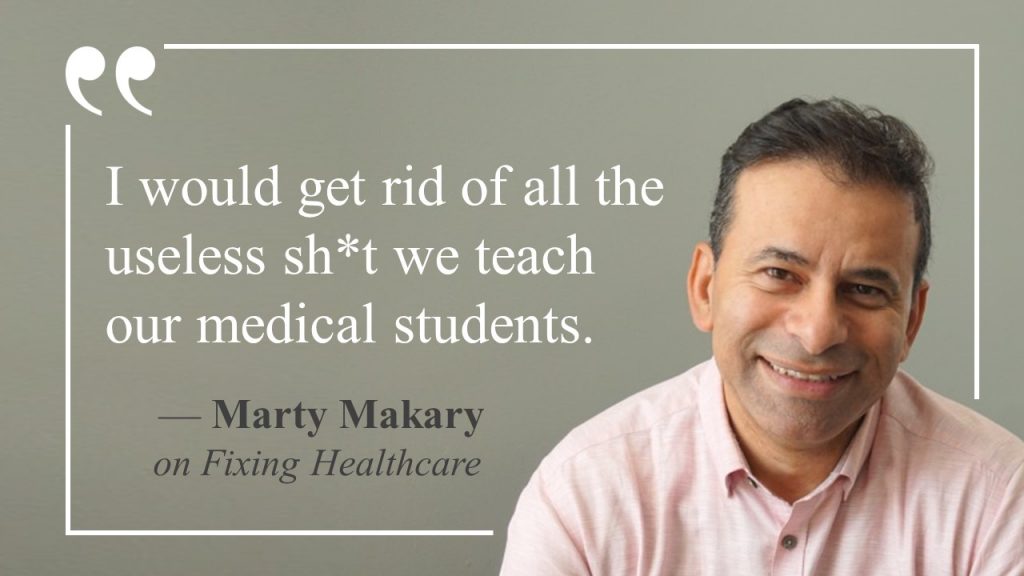Podcast: Play in new window | Download
Subscribe: Spotify | Email | RSS | More
Marty Makary, a nationally renowned surgeon and educator at Johns Hopkins, goes about life as if having ingested a truth serum for which there is no antidote. Hear him speak or read his writing, and you’ll find no punches pulled.
On Fox News, where he’s a regular commentator, Makary was openly critical of the CDC’s double-masking recommendation, calling it “mostly a show.” And in a WSJ article published in February 2021, he claimed the U.S. would achieve herd immunity by April, arguing that experts had radically under-calculated the nation’s “natural immunity.” In his latest book, The Price We Pay, Makary boldly confessed to having overprescribed opioid medications to his patients.
Some view Makary’s self-imposed honesty policy as a public service, both righteous and good. Others call him reckless and attention-seeking. He is aware that his unique brand of candor isn’t for everyone: “It’s a lonely place, when you try to talk truth to what you truly believe based on the best information.”
Dr. Robert Pearl and Jeremy Corr called upon Makary to share his unfiltered views about the culture of American medicine. The doctor did not disappoint.
Marty Makary’s Interview Highlights
On useless memorization in medical education
“I would get rid of all the useless sh*t we teach our medical students and pre-med students and residents and fellows—all the 16 years of education that I went through, learning stuff that has nothing to do with patient care that you don’t need to memorize. And it came at the exclusion of so many other things that are important to know, like how to break bad news … We do that all the time to our young. It’s disgusting what we’re doing, making every medical student memorize the Krebs Cycle at six different points in their education, for what?”
On humility
“I have enormous respect for … Dr. Fauci and many others, but I think it would help their credibility if they showed more humility and apologized for some of the big things they got wrong. I tried to do this myself in my recent book, The Price We Pay, with all the opioids I prescribed. All my colleagues were doing it as well. It didn’t make it right. I still feel bad about it. I mean, probably some people had fatal addiction from opioids that I gave them, they should not have received. Now, I could justify it, but you know what? It’s therapeutic to me at least to say, ‘I had it wrong.’ And it’s probably good for people to see that humility.”
On the oligarchy of medical journals
“The journals have been largely controlled by a very small group of like-minded people and they tend to use cronyism to hire their editorial boards … The value of diversity is to bring multiple points of view, sometimes points of view that challenge preexisting ideas.”
On letting doctors be doctors
“Can I say something a little radical here? How about we get the monkeys off our back as doctors? All this peer-to-peer, pre-authorization, you can’t do this on this, the all-or-nothing clinical pathways that disregard the fact that every patient is unique. They’re individuals with their own wishes and their own goals and their own unique circumstances, especially when they’re older. How about we let doctors be doctors, accept practice variation but do it within certain boundaries where we can look at the practice on an annual basis or on a six month basis and say that this practice pattern appears to be reasonable or this practice pattern appears to be a pattern of concern, a yellow flag or this practice pattern exceeds a threshold that a broad consensus of experts believe to be indefensible.”
On suing patients for unpaid medical bills
“I’ve yet to find more than a handful of people that think it’s reasonable to sue the socks off an everyday Walmart worker or food-service worker who had insurance and couldn’t afford to pay their bill. The hospitals do this to garnish their paychecks, and it’s a disgrace. It harms the precious public trust. That incredible heritage of taking care of anyone in need … been eroded by this horrible corporate practice of price gouging and predatory billing. And every healthcare professional in America should be offended by this disgusting practice.”
On futile care in the ICU
“If you look at the appropriateness of care, we’ve got two problems: over-treatment and under-treatment. But by far, over-treatment is dominating the problem right now. In the ICU, we have the problem of futile care, care that’s entirely senseless and disrespectful and provides no dignity. And it’s painful for anyone to watch. Any reasonable person would know no one would want to be treated that way. We see that, and sometimes we’re helpless with that because ultimately it’s the family’s decision.”
On living in a nation of extremes
“Why does everything in America have to be one extreme or the other? Why do you have to be all pro-universal, double masking after vaccination or no masking whatsoever; masks are BS. Why is it that we have such a hard time, being in this lonely place in the middle where you’re actually just intellectually following what you believe to be the best science and what’s reasonable?”
READ: Full transcript with Marty Makary
Fixing Healthcare is in its fifth season, which focuses on the culture of medicine. For Dr. Robert Pearl, this topic is of vital importance. For years, he has been researching and reporting on physician culture—efforts that culminate May 18, 2021 with the publication of his book “Uncaring: How Physician Culture Is Killing Doctors & Patients.”
* * *
Fixing Healthcare is a co-production of Dr. Robert Pearl and Jeremy Corr. Subscribe to the show via Apple Podcasts or wherever you find podcasts. Join the conversation or suggest a guest by following the show on Twitter and LinkedIn.

